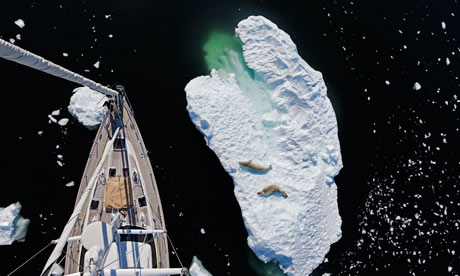Greenland and Antarctica losing 4 trillions tonnes of ice...
The Guardian,


The study found that while eastern Antarctic was gaining some ice, other areas were losing twice as much. Photograph: Mike Powell/Corbis
More than 4 trillon tonnes of ice from Greenland and Antarctica has melted in the past 20 years and flowed into the oceans, pushing up sea levels, according to a study that provides the best measure to date of the effect climate change is having on the earth's biggest ice sheets.
The research involved dozens of scientists and 10 satellite missions and presents a disturbing picture of the impact of recent warming at the poles.
The scientists claim the study, published in the journal Science, ends a long-running debate over whether the vast ice sheet covering the Antarctic continent is losing or gaining mass. East Antarctica is gaining some ice, the satellite data shows, but west Antarctica and the Antarctic peninsula is losing twice as much, meaning overall the sheet is melting.
"The estimates are the most reliable to date, and end 20 years of uncertainty of ice mass changes in Antarctica and Greenland," said study leader, Andrew Shepherd, of Leeds University. "There have been 30 different estimates of the sea level rise contribution of Greenland and Antarctica, ranging from an annual 2mm rise to a 0.4mm fall.
"We can state definitively that both Greenland and Antarctica are losing mass, and as [the] temperature goes up we are going to lose more ice."
The study shows the melting of the two giant ice sheets has caused the seas to rise by more than 11mm in 20 years. It also found Greenland is losing ice mass at five times the rate of the early 1990s.
The uncertainties over ice cap melting have made it difficult for scientists to predict sea level rise. But Prof Richard Alley, of Penn State University, US, who was not involved in the study, said: "This project is a spectacular achievement. The data will support essential testing of predictive models, and will lead to a better understanding of how sea level change may depend on the human decisions that influence global temperatures." Rising sea level is one of the greatest long-term threats posed by climate change, threatening low-lying cities and increasing the damage wrought by hurricanes and typhoons.
Read more:
http://www.guardian.co.uk/environment/2012/nov/29/greenland-antarctica-4-trillion-tonnes-ice
Ecospree
The research involved dozens of scientists and 10 satellite missions and presents a disturbing picture of the impact of recent warming at the poles.
The scientists claim the study, published in the journal Science, ends a long-running debate over whether the vast ice sheet covering the Antarctic continent is losing or gaining mass. East Antarctica is gaining some ice, the satellite data shows, but west Antarctica and the Antarctic peninsula is losing twice as much, meaning overall the sheet is melting.
"The estimates are the most reliable to date, and end 20 years of uncertainty of ice mass changes in Antarctica and Greenland," said study leader, Andrew Shepherd, of Leeds University. "There have been 30 different estimates of the sea level rise contribution of Greenland and Antarctica, ranging from an annual 2mm rise to a 0.4mm fall.
"We can state definitively that both Greenland and Antarctica are losing mass, and as [the] temperature goes up we are going to lose more ice."
The study shows the melting of the two giant ice sheets has caused the seas to rise by more than 11mm in 20 years. It also found Greenland is losing ice mass at five times the rate of the early 1990s.
The uncertainties over ice cap melting have made it difficult for scientists to predict sea level rise. But Prof Richard Alley, of Penn State University, US, who was not involved in the study, said: "This project is a spectacular achievement. The data will support essential testing of predictive models, and will lead to a better understanding of how sea level change may depend on the human decisions that influence global temperatures." Rising sea level is one of the greatest long-term threats posed by climate change, threatening low-lying cities and increasing the damage wrought by hurricanes and typhoons.
Read more:
http://www.guardian.co.uk/environment/2012/nov/29/greenland-antarctica-4-trillion-tonnes-ice
Ecospree


2 Comments:
It is a huge problem isn't it, one day we will wake up and accept that something has to be done.xxxxx
Provided we don't talk too much first.
Post a Comment
Subscribe to Post Comments [Atom]
<< Home